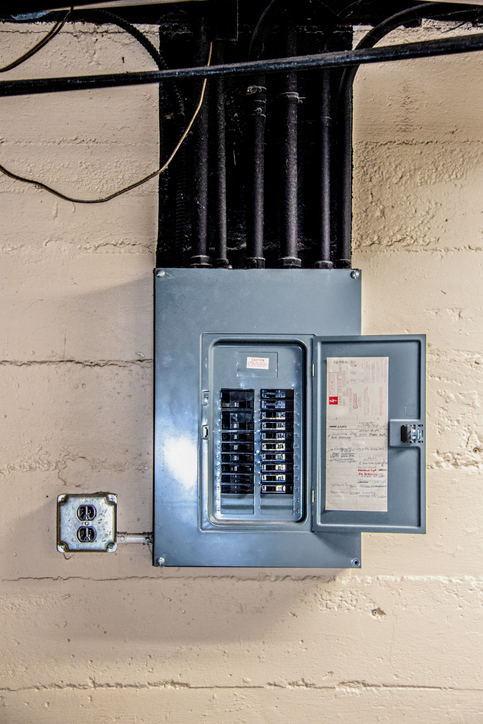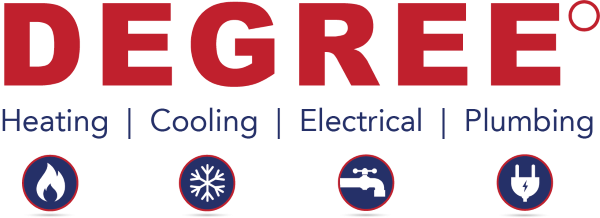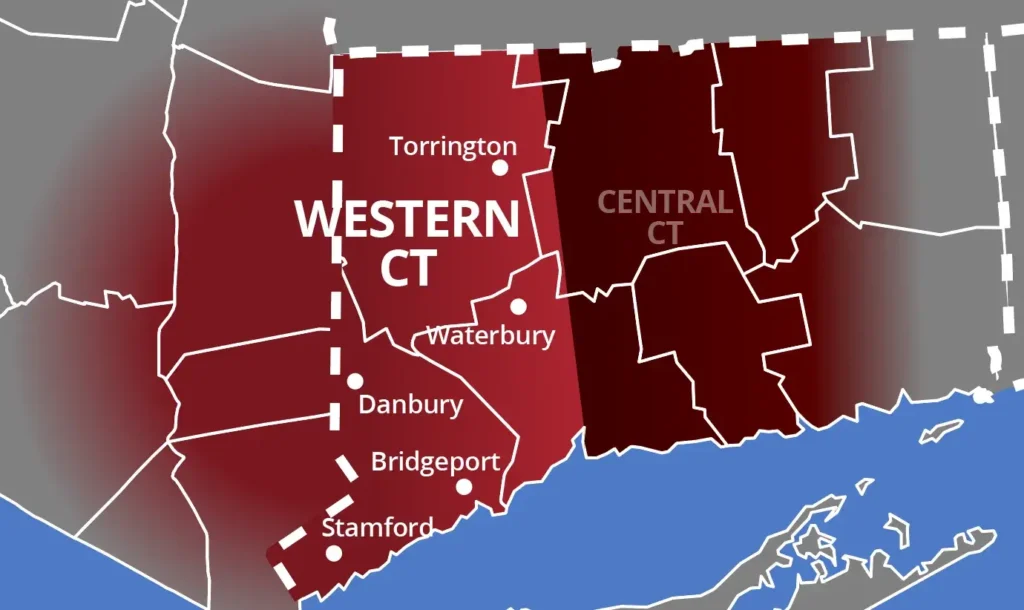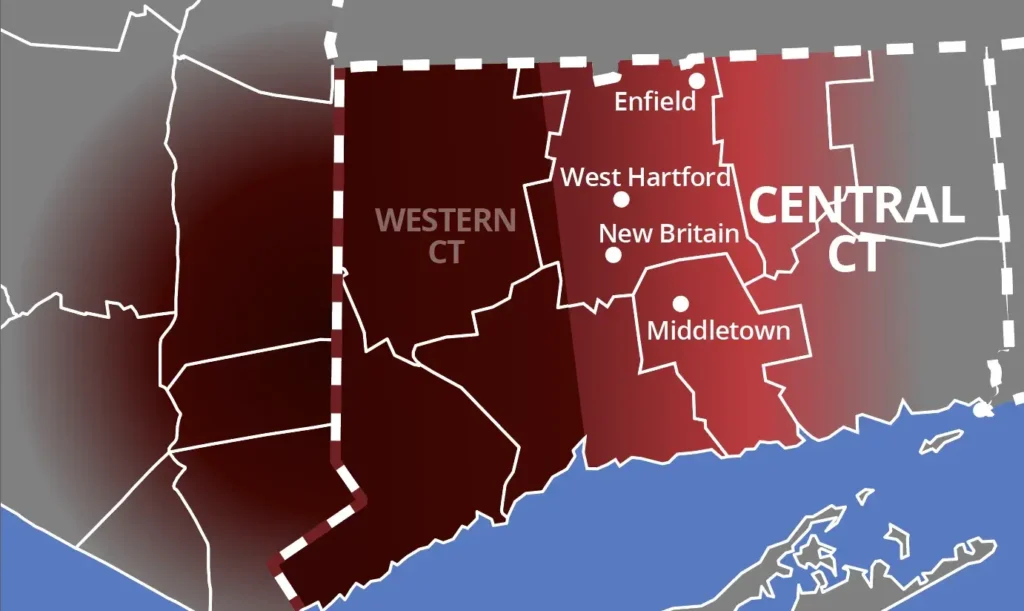What is a Residential Electrical Panel?

Your Connecticut home’s electrical panel, also sometimes called a breaker box, service panel, or load center, is the central hub that distributes electricity throughout your house. It’s like the heart of your home’s entire electrical system. This metal box, typically mounted on a wall in your basement, garage, or utility room, receives power from your utility company and safely distributes it to individual circuits that power your home’s lights, outlets, and appliances.
Inside the panel, you’ll find circuit breakers or fuses that act as safety switches. Each breaker controls power to a specific area or appliance in your home. When too much electrical current flows through a circuit, the breaker automatically “trips” or shuts off to prevent overheating, fires, or electrical damage.
Modern electrical panels typically handle 100, 150, or 200 amps of service, with 200-amp panels being standard in most newer homes to accommodate today’s electrical demands.
How Do I Know When My Electrical Panel Needs Attention
Immediate Safety Concerns (Call a Professional Right Away)
Burning Smells or Scorch Marks: If you notice any burning odors coming from your panel or see black, brown, or discolored areas around breakers, this indicates dangerous overheating. This requires immediate professional attention.
Buzzing, Crackling, or Sizzling Sounds: Electrical panels should operate silently. Any unusual sounds means you might have some loose connections, arcing, or failing components that pose fire risks.
Frequent Breaker Trips: While occasional breaker trips are normal, frequent tripping indicates your electrical system is overloaded or there’s a fault in the wiring.
Warm or Hot Panel: Your electrical panel should never feel warm to the touch. Heat indicates dangerous conditions that could lead to fires.
Performance Issues Indicating Electrical Repair Needs
Flickering or Dimming Lights: When lights dim as appliances start up, or flicker without obvious cause, your panel may have loose connections or insufficient capacity.
Mild Electrical Shocks: Getting small shocks from appliances or switches often indicates grounding problems in your electrical system.
GFCI Outlets Not Working Properly: If ground fault circuit interrupter outlets won’t reset or trip frequently, there may be wiring issues connected to your panel.
When Should I Replace MY Electrical Panel?
Age and Obsolete Technology
Fuse Boxes: Homes with old fuse boxes instead of circuit breakers need immediate upgrades. Fuses are outdated technology that doesn’t provide adequate protection for modern electrical loads.
Federal Pacific Electric (FPE) Panels: These panels, installed primarily between 1950-1980, have known safety defects. The breakers often fail to trip when they should, creating serious fire hazards.
Zinsco Panels: Popular in the 1970s, these panels have breakers that can overheat and fail to disconnect properly during overload conditions.
Panels Over 25-30 Years Old: Even standard breaker panels from the 1980s and early 1990s should be evaluated for replacement as components age and electrical codes evolve.
Insufficient Electrical Capacity
100-Amp Service in Modern Homes If your home has 100-amp service but you’ve added central air conditioning, electric vehicles, hot tubs, or multiple high-power appliances, you likely need an upgrade to 200-amp service.
Adding Major Appliances Installing electric vehicle chargers, pool equipment, workshops, or home additions often requires panel upgrades to handle the increased electrical load safely.
Home Renovations Kitchen remodels, finished basements, or room additions typically require additional circuits that your current panel may not accommodate.
Code Compliance Issues
Missing GFCI Protection: Older panels may lack ground fault protection required by current electrical codes for bathrooms, kitchens, garages, and outdoor areas.
Inadequate Grounding: Homes built before modern grounding requirements may need panel upgrades to meet current safety standards.
Insurance Requirements: Some insurance companies require electrical panel upgrades, particularly for FPE or Zinsco panels, to maintain coverage.
Should I Repair or Replace My Electrical Panel?
When Repairs May Be Sufficient
- Individual breaker replacement in newer panels
- Fixing loose connections in structurally sound panels
- Adding a few circuits to panels with available space
- Upgrading specific safety features like GFCI breakers
When Replacement is the Better Choice
- Any safety-related panel brand (FPE, Zinsco)
- Panels over 25 years old with multiple issues
- Insufficient capacity for your electrical needs
- Extensive corrosion or physical damage
- Major home electrical upgrades
Why Should I Call a Professional Electrician?
Electrical panel work involves high-voltage connections and must comply with local electrical codes and permit requirements. Licensed electricians have the expertise to:
- Safely disconnect and reconnect utility power
- Ensure proper grounding and bonding
- Size panels and circuits correctly for your needs
- Obtain necessary permits and pass inspections
- Provide warranties on their work
Attempting DIY electrical panel work is extremely dangerous and typically violates local codes and insurance policies.
Protecting Your Investment
Regular electrical panel maintenance and timely upgrades protect your home, family, and belongings. A properly functioning electrical system reduces fire risks, prevents damage to electronics and appliances, and ensures your home meets current safety standards.
If you’re experiencing any of the warning signs mentioned above, or if your home has an older electrical panel, for a professional evaluation. They can assess your current system and recommend the most cost-effective solution for your specific situation. Our team of electricians can help you understand your choices and solve your electrical problems. Call us now for more information.
Remember: When it comes to electrical safety, it’s always better to address concerns proactively rather than wait for problems to escalate.




